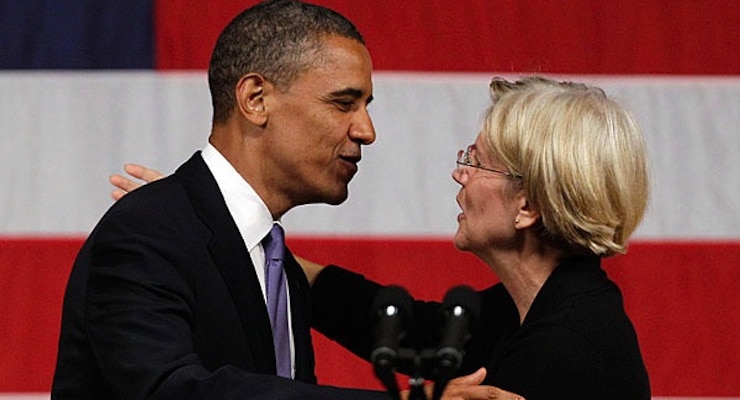

President Barack Obama leans in to kiss Massachusetts senatorial candidate Elizabeth Warren after she introduced Obama before he addresses supporters during a June campaign fundraiser at Symphony Hall in Boston. (Photo: Stephan Savoia/AP)
The prevailing social dogma of our time — that economic and other disparities among groups are strange, if not sinister — has set off bitter disputes between those who blame genetic differences and those who blame discrimination.
Both sides ignore the possibility that groups themselves may differ in their orientations, their priorities and in what they are prepared to sacrifice for the sake of other things.
Back in the early 19th century, an official of the Russian Empire reported that even the poorest Jews saw to it that their daughters could read, and their homes had at least ten books. This was at a time when the vast majority of the population of the Russian Empire were illiterate.
During that same era, Thomas Jefferson complained that there was not a single bookstore where he lived. In Frederick Law Olmsted’s travels through the antebellum South, he noted that even plantation owners seldom had many books.
But in mid-18th century Scotland, even people of modest means had books, and those too poor to buy them could rent books from lending libraries, which were common throughout Scottish towns.
There is no economic determinism. People choose what to spend their money on, and what to spend their time on. Cultures differ.
On a personal note, as a child nearly nine years old, I was one of the many blacks who migrated from the South to Harlem in the 1930s.
Although New York had public libraries, elite public high schools and free colleges of high quality, I had no idea what a public library was, or what an elite high school was, and the thought of going to college never crossed my mind.
Jewish immigrants who arrived in New York, generations before me, seized upon the opportunities provided by public libraries and later their children flooded into the elite public high schools and free city colleges. This was consistent with the values of their centuries-old culture.
For most of the black kids of my generation, those things might as well not have existed, because nothing in their culture would have pointed them toward such things.
There was no reason to believe that I would have been any different from the rest, except for the fact that members of my family, who had very little education themselves, wanted me to get the education that they never had a chance to get.
They had no more idea of the role of public libraries and elite quality high schools and colleges than I did. But they knew a boy a little older than I was, who came from a better educated family, and they decided that he was somebody I should meet and who could serve as a guide to me on things they knew nothing about.
His name was Eddie Mapp, and I can still recall how he took me to a public library, and how patiently he tried to explain to me what a public library was, and why I should get a library card. He opened a door for me into a wider world. But most other black kids in Harlem at that time had no one to do that for them.
Nor did kids from various other ethnic groups in New York have someone to open doors to a wider world for them. It didn’t matter how smart they were or whether opportunities were available for them, if they knew nothing about them.
An internationally renowned scholar of Irish American ancestry once said in a social gathering that, when he was a young man of college age, he had no plans to go to college, until someone else who recognized his ability urged him to do so. There was no reason to expect all groups to follow in the footsteps of the Jews.
In my later years, two middle-class couples I knew took it upon themselves to each take a young relative from the ghetto into their home and, at considerable cost in time and money, try to provide them with a good education.
One of these youngsters had an IQ two standard deviations above the mean. But both of them eventually returned to the ghetto life from which they came. It wasn’t genetics and it wasn’t discrimination.
The youngster with an IQ two standard deviations above the mean will probably never achieve what a Jewish or Asian youngster with an IQ only one standard deviation above the mean achieves.
Those who are celebrating the ghetto culture might consider what the cost is to those being raised in that culture. And they might reconsider what they are hearing from charlatans parading statistical disparities.






